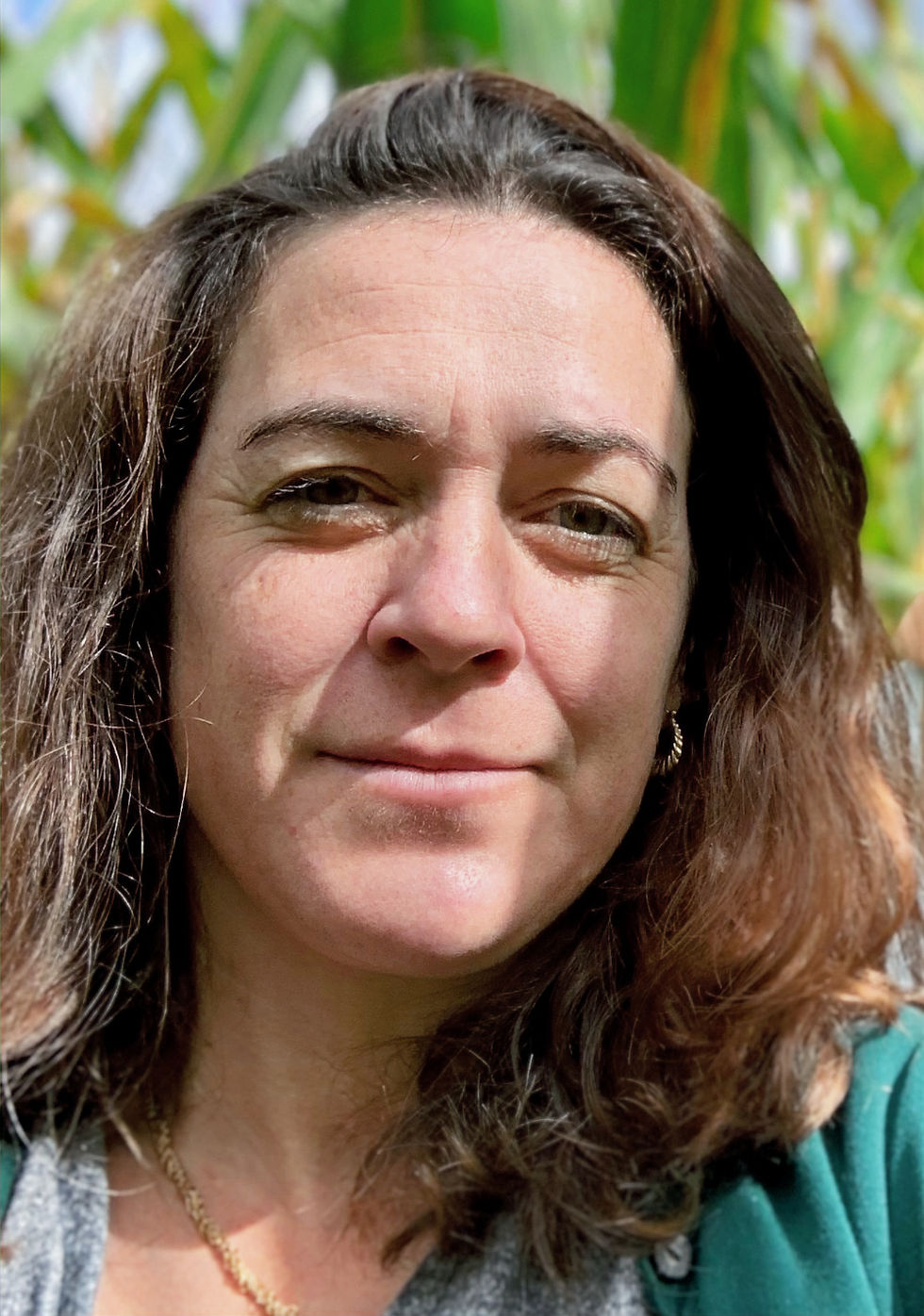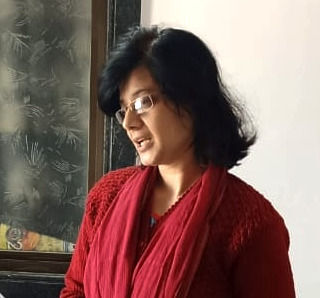BRIDGE BETWEEN
- jenminotti

- May 14, 2025
- 6 min read
By Nina Rubinstein Alonso

PROMPT — What is Love?
The first meet-the-family-dinner was silent and awkward, silverware clicking and clacking, but afterwards Peter’s brother Bob asked Leah. “Why did you elope with my brother? You’re nineteen, artsy, he’s twenty six, a lawyer, makes no sense as you two are nothing alike. Why?” She’s offended but pretends to be amused and asks why he married his wife Bebe, a philosophy grad student currently crying in the bathroom because she’s pregnant but doesn’t want to be, decided to keep the baby though she disapproves of increasing the population of a planet she considers corrupt, polluted and doomed.
Bob grins, “Got me, touché, Bebe’s knocked up, not happy about it.” He seems to enjoy using crude lingo despite doing his PhD in classical literature at Harvard, as if crappy language is a refreshing break from the stuffiness of ancient pages.
When Leah told Peter she’s thinking of leaving DC, “What? You’re confused, see a psychiatrist.” She doesn’t mention recognizing him in the article she read about erectile dysfunction but is depressed enough to try a psychiatrist though she’s saving money to buy a plane ticket.
The psychiatrist listens for forty minutes but says nothing except ‘see you next week.’ She calls Heidi, says she’s flying in Thursday, and Heidi agrees to pick her up at Logan airport, then adds, “I’ve been waiting for your call, figured you’d leave him, total mismatch.” Seems others noticed her blunder before she did. Trying to sleep on Heidi’s couch in Cambridge, Leah’s jittery, tosses and turns.
Her mother doesn’t seem surprised, admits she’s had doubts about Peter, says, ‘too bad things didn’t work out,’ and hands her a substantial check. “Let me know what else you need,” as Leah’s in graduate school, ie, broke. She finds an au pair job with a professorial family from Paris as her French is pretty good, catches rides with friends to Brandeis, but second semester she’s preparing for orals, too busy to babysit, has to say au revoir.
She finds a cheap flat on Hubbard Ave., drags her mattress, a frying pan, some dishes, and a thrift-shop rocking chair up two flights of stairs. Heidi frowns at the dingy place, though glad it’s near Whittier Street where she lives with her film-maker husband and baby.
When Bob hears Leah’s divorcing his brother he introduces her to a professor friend at MIT who’s doing research on Irish politics and the Catholic Church. Leah’s emotionally raw but likes Emmet as he’s even-tempered and affectionate. When he hints about legalizing their relationship ‘later,’ she lets those words float by, says nothing, as she isn’t even divorced yet. She’s been working with a lawyer her mom hired as Peter is being difficult, resists signing final papers, even phoned asking her to come back claiming he didn’t realize how unhappy she was, doesn’t recall how he brushed off her concerns as ‘neurotic and emotional.’
She knows she should have left sooner, is annoyed at herself for bothering with that useless therapist, the one who said ‘see you next time’ even when she told him she had a plane ticket and was leaving DC. Maybe he thought silent listening was enough or was tuned out, distracted, in the wrong profession, sick of hearing sad stories. Before leaving she dropped by the local pottery studio and smashed all the clay bowls she’d made there, glad to have something it was fine to destroy.
She had tea with one of her college teachers, Renata, who’d just moved to DC, talked about the stress of doing Brandeis course work at a distance and complained about a boring rhetoric class at Catholic University. When Renata asked what else was going on, Leah said “marrying Peter was a mistake.”
“Reminds me of my first marriage, another young, impulsive blunder. What do you want to do?”
“Leave, end it.”
It helped to hear about Renata’s early mistake marriage and divorce, a relief to hear her brush off Peter’s comments as “bullying, putting blame on you.”
Recently Peter told her he’d dated a student at Harvard Law School who was from South Africa, but when his parents heard she was black they threatened to cut him off financially if he didn’t end it, so he did. Maybe he thought hearing this would make her sympathetic? All it did was confirm what she’d suspected, that she was the white, Jewish parent-acceptable substitute, guaranteeing an unbroken flow of financial support, dissolving any doubts about leaving him.
In June, Emmet traveled to Rome to do research at the Vatican library on the history of the Catholic Church in Ireland. He parked his blue MG near Leah’s Hubbard Ave. row house and gave her the keys. She agreed to keep an eye on it, though he knew she didn’t plan to drive it as she’d just bought a dented beige VW Bug from a local mechanic. But mid-July an architect who lived in the building posted a notice saying she’d heard odd noises in the end wall, took a closer look, decided the structure was dangerous and contacted the city. Officials arrived tapping bricks, making notes on the building’s condition.
Leah knew the stairs to her second floor flat tilted and window angles were slightly ‘off,’ but figured it was an old building, never suspected it might collapse. In August the city condemned the structure, wrapped the front doors with blue plastic tape the tenants had to crawl by and posted a legal notice ordering everyone to move out as fast as possible.
She’d been taking care of baby Sara while Heidi was in Greece where John was filming, just brought her to John’s mother as they’d planned for Leah to do the first two weeks of childcare, then John’s mother would take over as Leah needed to prepare for a language exam. Big relief that nothing terrible had happened while the baby slept in her portable crib next to Leah’s mattress, but the language exam would have to wait while she found somewhere else to live.
Apartments she visited were too expensive or too dismal, but she liked a third floor attic on Walden Street that had angled ceilings, a clunky space heater and an antiquated bathtub with lion-paw legs. She signed the lease, moved her things to the new place in her Bug then drove Emmet’s MG there. After everyone was out of that Hubbard Ave. building, the city tore it down, then a developer bulldozed the site and started work on a fancy five-story.
Leah’s favorite place to sip cafe con leche was The Pamplona, a small place in Harvard Square, and that’s where she met Miguel, who worked part-time as he knew the owner, Josefina, a family friend. He lived near Leah’s attic on Walden Street, and they connected.
Sometimes he’d show her wire stars and table designs he was building with his friend Jared for their small business, Omni Design. If her VW Bug wouldn’t start, he’d give her a ride to Harvard Square. He was sensitive, attractive, they got very close and moved in together. When Emmet returned from Rome late August she explained her move, adding that she was too busy with grad school to see him, the nicest lie she could think of.
He looked slightly disappointed but not surprised as he’d been out of the country for months and was busy revising his book on Irish politics and the church while considering whether to accept a tenure track position he’s been offered at the University of Chicago. Though his MG had been sitting all summer, it fired up nicely, he waved and drove away.
Finding someone uniquely simpatico is impossible to predict. Leah and Miguel met by chance, connected, loved each other, and after a few years did the legal thing, though by then it didn’t matter much, as their heart connection was deeper than any paperwork. She never saw Emmet again, which was just as well, no need to tell him he was the bridge between.
Nina Rubinstein Alonso writes both stories and poetry. Her work has been published in Ploughshares, The New Yorker, Writing in a Woman’s Voice, Bagelbards Anthology, Broadkill Review, Southern Women’s Review, Bluepepper, Peacock Journal, and more. Her publications include: Riot Wake (Cervena Barva Press), Distractions En Route (Ibbetson Street Press), Travels With Fernando (Wilderness House Press), and This Body (Godine Press). Nina writes from Cambridge, MA.



